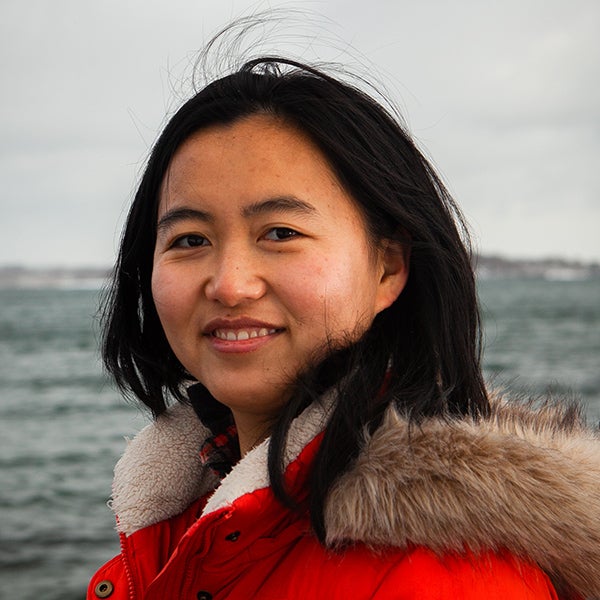Hongjie Wang, Assistant Professor of Oceanography
By Alexander Castro
 Hongjie Wang grew up near the Yellow River, the sixth largest river in the world, but even that immensity didn’t prepare her for the ocean. Upon reaching the Pacific’s shores for the first time as an undergrad, she says: “I went to the beach. [And I learned] what ‘massive’ means.”
Hongjie Wang grew up near the Yellow River, the sixth largest river in the world, but even that immensity didn’t prepare her for the ocean. Upon reaching the Pacific’s shores for the first time as an undergrad, she says: “I went to the beach. [And I learned] what ‘massive’ means.”
That seaside memory also included a sip of seawater—more unpleasant than perspective-shifting. Yes, the ocean tasted bad, “horrible” even, but Wang became interested in its study and preservation. The ocean isn’t unlike the Yellow River, which fundamentally shaped China’s early development and history, as well as Wang’s earliest research interests: “I wanted to protect ‘mother river,’” she says.
That led Wang to study environmental science at the Ocean University of China for her bachelor’s degree, followed by a pivot to marine chemistry for her Master of Science at Xiamen University. There Wang acquired an interest in carbon cycling, which eventually brought her to the U.S. and Texas A&M University to study the balmy waters of the Gulf Coast for her Ph.D.
Wang arrived at GSO as an assistant professor earlier this year, and though she jokes that new faculty would be better off arriving in spring, the Northeast’s chilly welcome hasn’t cooled her research. “What kind of processes can impact distribution of CO2?” is a basic question Wang investigates, one she’s now pursuing in the Narragansett Bay. Questioning CO2 dynamics there has led this chemical oceanographer to another serendipitous discovery: kelp farming.
“It’s a brand new thing for me,” Wang says excitedly. Previously she’d only known kelp as a snack food. “I didn’t know how fast it can grow. I didn’t know how people plant them.”
Turns out kelp may play the same helpful, oxygenating role that terrestrial plants do. “You can imagine the kelp in the ocean like a forest on the land,” Wang says.
Existing kelp forests already remove atmospheric carbon via photosynthesis. While “there’s nothing new about kelp forests,” Wang confirms, the past decade has seen an explosive interest in the algae’s carbon sequestration. But Wang cautions: “We don’t have enough data to know whether it’s sufficient to slow down climate change.”
Would large-scale cultivation of kelp be an elegant solution or an unwieldy one? Wang has been gathering data on whether kelp really is a “sufficient” ally while working with local kelp farmers: “They can teach me a lot of things you cannot learn from a textbook.”
Motherhood has made the need for climate solutions seem even more pressing to Wang: “Now that I’m a mom, I want to protect the environment for my kids.”
That involves cultivating not only potential kelp but the next generation of oceanographers, too. Speaking as a formerly “shy” international student herself, Wang says her doctoral studies at Texas A&M, and the support of her colleagues then, were essential in shaping not only her career but her personality and drive.
“The smallest things may be a big deal for international students,” Wang says. But her support team in Texas “really raised me up to be confident and outspoken…I hope I can do the same thing for some other students in the future.”
Wang will be interacting with students more soon: she’s been enjoying a classless schedule for her first few months at GSO, a courtesy afforded new hires. Come fall semester, however, Wang will teach her first course at GSO — OCG 110, “The Ocean Planet.” It’s an evocative title, and an appropriate one for someone whose experience of the ocean began, and has continued, with wonder at its vastness.
